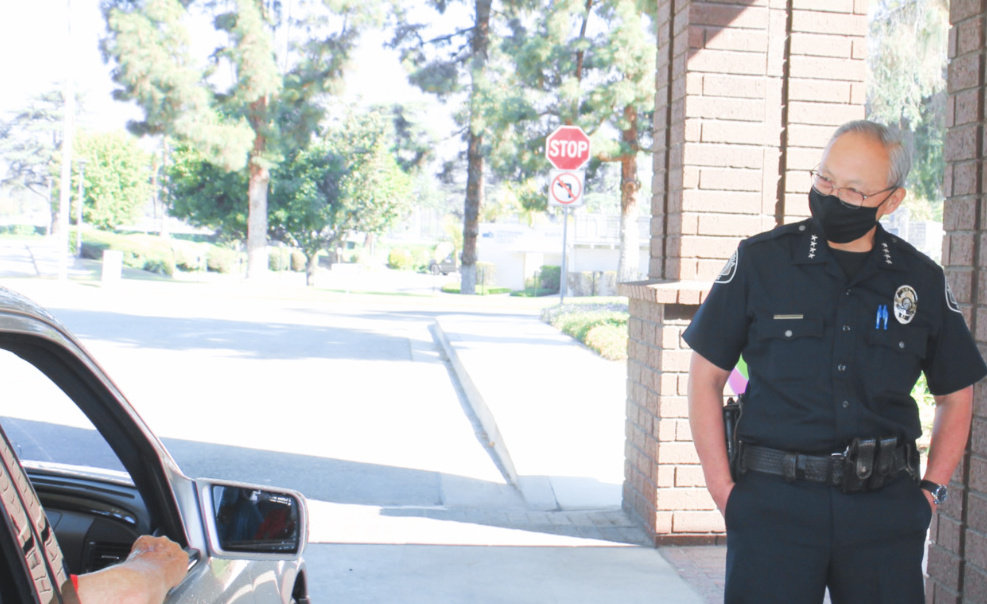Chief Roy Nakamura takes a moment to chat with community members at the April 28 event.
For Japanese Americans, there is a shared history with different viewpoints on policing and safety. Law enforcement and community leaders all seek to answer the question, ‘What should community safety look like?’ amid rising anti-Asian racism and violence.
By Lynda Lin Grigsby, Contributor
One life imprisoned can cause a ripple effect that spans generations. What happens when it is 120,000 people targeted by the government for imprisonment?
It causes collective, intergenerational trauma.
The World War II incarceration of Japanese Americans is a touchstone of pain and identity for a community that during that time in U.S. history was identified as such a threat to national security, its members needed to be surveilled, detained and imprisoned.
One shared experience refracted across generations can produce a variety of perceptions, especially in the debate about policing, imprisonment and public safety. Because of their shared WWII experience, some Japanese Americans argue that it is time to re-examine policing and America’s criminal justice system.
“I know the intergenerational harms that arresting people and incarcerating them causes,” said Carl Takei, a senior staff attorney with the American Civil Liberties Union. “And if we can build something different that’s more compassionate, then we should.”
In Arcadia, Calif., a suburb of Los Angeles, the city’s first Japanese American police chief raps on his desk to summon continued good fortune.
“We have been very lucky,” said Roy Nakamura about his city’s clean slate of anti-Asian hate crime, a sharp contrast to the spike in these reports across the nation.
The controversy about the future of law enforcement is rife with pain and emotion. With the April 20 Derek Chauvin murder conviction fresh in memory, police officers across the U.S. fatally shot six people just 24 hours after jurors in Minneapolis handed in a guilty verdict, according to the Associated Press. The circumstances of the deaths vary widely. Some say they reflect an urgent need for radical changes to American policing.
In the Japanese American community, the debate takes on an added layer of tension between a community’s shared history and a collective desire for safety amid a surge in anti-Asian racism.
Both sides of the debate seek to answer a fundamental question: What should community safety look like?
The Police Chief: Change Is Necessary
To talk about the future of policing, one needs to examine what exists and what came before.
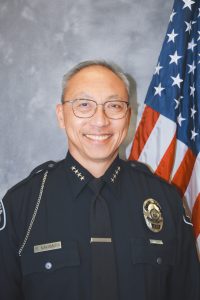
Roy Nakamura, a 28-year veteran, is Arcadia’s first Japanese American police chief. He was appointed in October 2020.
“I believe that we should always study history so that we never repeat our mistakes,” said Nakamura, 56.
The Sansei police chief is talking about cancel culture, the modern-day form of ostracism and erasure, which police departments are facing in varying degrees. A March USA Today/IPSOS poll revealed an increase in trust (69 percent, up from 56 percent last summer) in local police and law enforcement to promote justice and equal treatment for people of all races.
“What if you erase everything from the past? What if you don’t take into consideration the mistakes? I mean, is there a possibility that we won’t be able to recall the mistakes that we’ve made as a community, as a society?” said Nakamura, who was appointed chief in January.
He was born in Tokyo and grew up in Guam before moving to Southern California to pursue education. Watching police TV shows drew Nakamura to a career in law enforcement. Something about the portrayal of police officers solving crime cases filled his head with aspirations.
Douglas Nakamura, a Nisei from Hawaii, always told his son, “Don’t live by the color of your skin. Let your work speak for you. Shut your mouth. Grind it out and do the best you can.”
During WWII while living on the island of Oahu, Douglas Nakamura watched other JAs get rounded up and incarcerated after Japan bombed Pearl Harbor. His family was spared, but he thought it was important to teach his children about the desolate War Relocation Authority prison camps and the heroism of the WWII segregated JA units in the U.S. military.
Today, with almost three decades of experience in law enforcement, Nakamura’s office at the Arcadia Police Department is across the street from Santa Anita Racetrack, where thousands of Japanese Americans were temporarily incarcerated in refurbished horse stalls during WWII.
For Nakamura, the lesson of the past informs his job as police chief — it is about community.
More than 57,000 people, 60 percent of whom identify as Asian American, live in Arcadia according to Census information. The city’s median home property value is over $1 million.
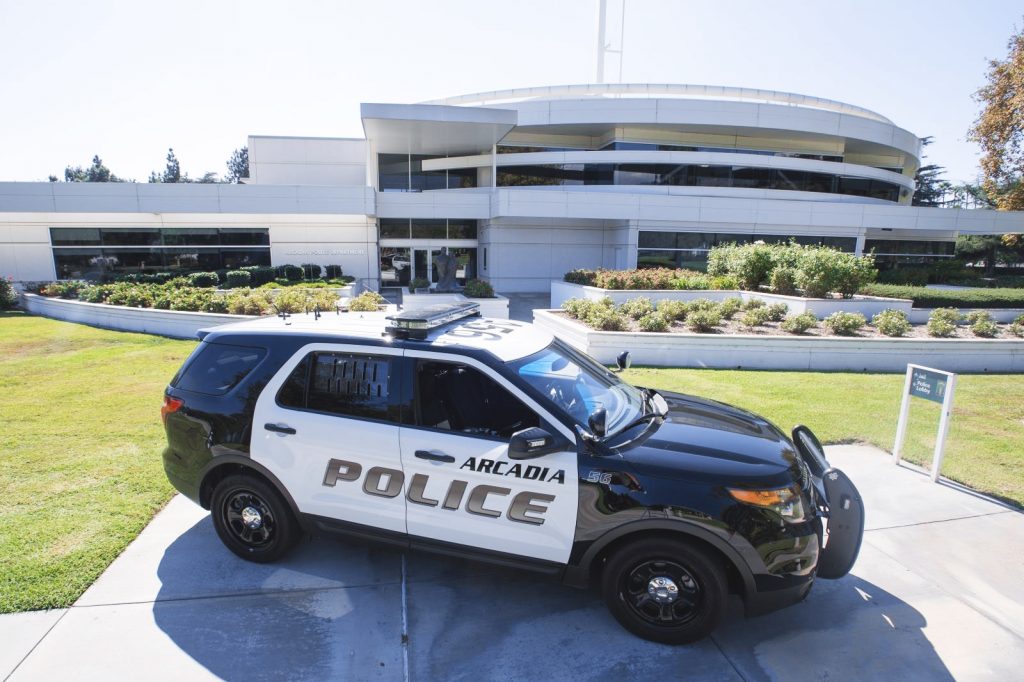
The Arcadia Police Department serves and protects a city of more than 57,000 residents, 60 percent of whom identify as Asian American.
Arcadia Police Department’s 72-sworn officers are tasked with keeping the city safe. It’s a job Nakamura says that needs examination, not cancelation.
“I’m not perfect. Neither are my officers,” said Nakamura. “We learn from our mistakes.”
To answer the call for changes to American policing, the police chief is advocating for regular audits of police departments to keep law enforcement accountable and ensure best practices reflect the needs of the community.
“Reform sounds ugly, and nobody likes change, including police chiefs and police officers. But I think that reforms, at times, are necessary,” said Nakamura.
The Communities: We Need Protection
In the first quarter of 2021, anti-Asian hate crimes increased by 164 percent, according to a new report from the Center for the Study of Hate and Extremism at California State University, San Bernardino.
So, what does safety look like in the time of hate and coronavirus?
“My vision for a safe city is one that takes into consideration the perspective of the community,” said Nakamura. “If the community does not feel safe, then I think that there’s a disconnect.”
On April 22, the Senate overwhelmingly passed an anti-hate crime bill aimed at addressing the surge in anti-Asian racism and attacks. The bill, sponsored by Mazie Hirono (D-Hawaii) and Grace Meng (D-N.Y.), seeks to establish online reporting of hate crimes and create a new Justice Department position to review hate crimes during the pandemic. The bill now goes to the House.
Even as lawmakers seek to pass legislation, anti-Asian hate continues to spew on the streets.
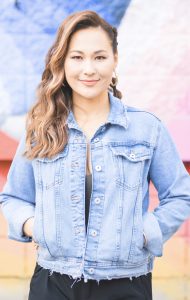
“I used to feel safe,” said Nadine Sachiko Hsu, a family photographer and owner of Sachiko Studio in Arcadia, Calif.
In Monterey Park, Calif., Nadine Sachiko Hsu, 41, said a man recently shouted anti-Asian slurs at her friend’s mom.
“I luckily have not been a victim,” said Hsu, owner of Sachiko Studio, a professional family photography studio in Arcadia. “We’re concerned, upset, mad and in disbelief.”
In a pandemic, running a small business is a struggle. Coupled with the threat of racism, it can be untenable. Hsu, who identifies as Japanese American and Caucasian, has a great-uncle who was incarcerated at Santa Anita and Manzanar. She supports stricter punishments for hate crimes and thinks policing is important to community safety.
“I haven’t heard anyone in the local police department come out and tell me they’re doing more to keep us safe or raising any awareness, which makes me feel uneasy,” said Hsu.
In San Jose’s Japantown, the economic effects of the pandemic on local businesses are visible. Some businesses either remain closed or can only operate limited hours. The historic area is home to many senior residents, who live in the area’s three housing facilities, and senior visitors, who frequent Japantown’s grocery store or senior center.
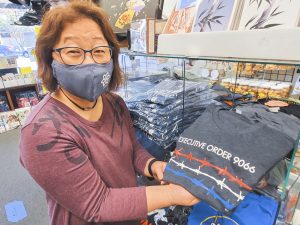
More police presence would help business owners feel safer, according to Pam Yoshida, co-president of the Japantown Community Congress of San Jose, West Valley JACL member and owner of Nikkei Traditions, a San Jose Japantown store.
Japantown seniors feel unsafe because of the increase in elderly attacks, which are unrelated to anti-Asian hate, said Pam Yoshida, co-president of the Japantown Community Congress of San Jose and a member of the West Valley JACL.
“We have had a few situations with seniors being knocked down on the sidewalk by someone who was mentally ill and do not believe these were motivated by anti-Asian hate,” said Yoshida, a Sansei.
In response to the attacks, retired San Jose Police officer Rich Saito started a volunteer community foot patrol, Japantown Prepared, to help protect the area and its seniors. The volunteers are intergenerational, racially diverse and come from all over the Bay Area to put on red vests and patrol Japantown.
“The residents feel very comfortable with the foot patrol volunteers,” said Yoshida, who also owns Nikkei Traditions, a Japantown store that sells Japanese American books, snacks and even T-shirts emblazoned with “Executive Order 9066.”
The San Jose Police department also increased its presence in Japantown with its foot and bike patrol, said Yoshida.
“Police engagement is crucial,” she said.
The Abolitionists: We Need to Imagine a Different World
In March, a gunman in Atlanta targeted and killed employees and patrons of spa businesses. Six of the eight victims of the mass shooting were of Asian descent. After news of the event shocked the nation, lawmakers in Seattle, Wash., held a virtual roundtable meeting with Asian American community leaders to talk about safety amid surging anti-Asian hate.
The Seattle Police department could increase patrol in the Chinatown International District, said a law enforcement official.
Seattle JACL President Stanley Shikuma, who attended the meeting, wondered how increased police presence in one concentrated area would protect Asian Americans who live throughout the Seattle area.
“It doesn’t,” said Shikuma, a Sansei. “It gives the impression that you’re doing something, but it doesn’t really solve the problem.”
The answer, Shikuma said, can be found by addressing the root causes of the issues like homelessness, mental health issues and food insecurity.
Shikuma, 67, is part of a growing number of Asian Americans who are approaching the call for increased community safety through an abolitionist lens.
Abolition is a political vision of a restructured society where community safety comes by fulfilling people’s foundational needs. If a person steals, then the question arises: Is it because they are experiencing food or housing insecurity? Then, abolitionists say we should direct resources and funds to meet those needs, not criminalize them.

Members and allies of Chicago-based Nikkei Uprising (from left) Cori Nakamura Lin, JJ Ueunten and Chris Aldana rallied in front of Cook County Jail on April 11 to call for the abolition of the jail.
On May 1, the Nikkei Abolition Study Group held its first virtual session to explore the ideas of community safety. The study group is the collaborative effort of three Japanese American organizations: Tsuru For Solidarity, the New York Day of Remembrance Committee and Nikkei Uprising in Chicago.
It is the first of six free monthly sessions focusing on community safety through an abolitionist framework. About 125 people from across the U.S. attended, said Linda Morris, who co-facilitated the first session.
Suggested reading included Mariame Kaba’s article, “So You’re Thinking About Becoming an Abolitionist,” but being an abolitionist is not required to be a part of the study group. Facilitators ask that participants identify as Nikkei, in part, to provide a space for a community with a shared history of overpolicing, surveillance and mass incarceration to talk openly about safety.
“Why do we equate safety with policing and the carceral system?” said Morris, 31, a civil rights lawyer in New York. “That’s something that we’ve experienced in our history, and we know that policing can be a very harmful institution and tool of the state.”
The FBI arrested Lisa Doi’s great-grandfather Kazuichi Doi after Japan bombed Pearl Harbor, indicating that he had been under surveillance for some time.
“Do I think the country was safer because my great-grandfather was arrested for being an active member of his Buddhist temple?” said Doi, Chicago JACL president and a community organizer with Tsuru for Solidarity. “No.”
During WWII, Morris’ grandparents were incarcerated at Manzanar, Jerome and Rohwer. Her family’s history provides a framework for closer self-examination.
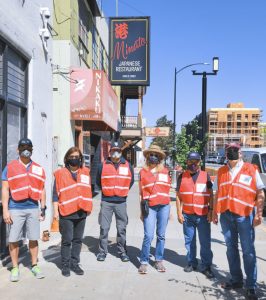
A volunteer community foot patrol is helping to protect San Jose Japantown seniors. Volunteers are intergenerational, racially diverse and come from all over the Bay Area.
Out of the isolation of the WRA camps emerged the narrative that the U.S. government wrongly imprisoned 120,000 innocent Japanese Americans, two-thirds of whom were American citizens. But community organizers like Morris want to challenge this narrative on two fronts by asking: When is incarceration OK? And what does innocence really mean?
“If we weren’t citizens, would it be OK then?” said Morris, who is Yonsei. “My great-grandparents weren’t citizens and were incarcerated, so was it OK then to incarcerate them? What was grounding our sense that we were good citizens, so we didn’t deserve it?”
Morris paused, then said pointedly, “We didn’t deserve it because we were human.”
Organizers say they are excited that the study group would provide space for tough conversations like these.
“Those points of tension and potential conflict are actually spaces that can be very generative and where we can begin to really come up with creative solutions and challenge our imagination,” said Morris.
Against a backdrop of increased violence and racism against Asian American, the study group’s focus on abolition contrasts with other community members’ call for increased policing.
It makes Shikuma wonder if the call for more policing is actually a reflex made out of habit.
“It’s a system that we inherited, so we just go along with it,” said Shikuma, who is a study group participant. “Some people get caught up in retribution and punishment. And that becomes the driving force: If someone does something wrong, we’ve got to make sure that they pay a price in the false belief that if you make the price high enough, they won’t do it. That logic doesn’t really work.”
Habits, according to author James Clear, are the small decisions and acts one makes daily. The good ones, he argues in the bestselling book, “Atomic Habits,” can help build better people and societies.
“Every action you take is a vote for the type of person you wish to become,” said Clear in his book.
Over time, the bad habits left unexamined can slowly wear us down like a coastal erosion.
The question is now, which way should we go?

